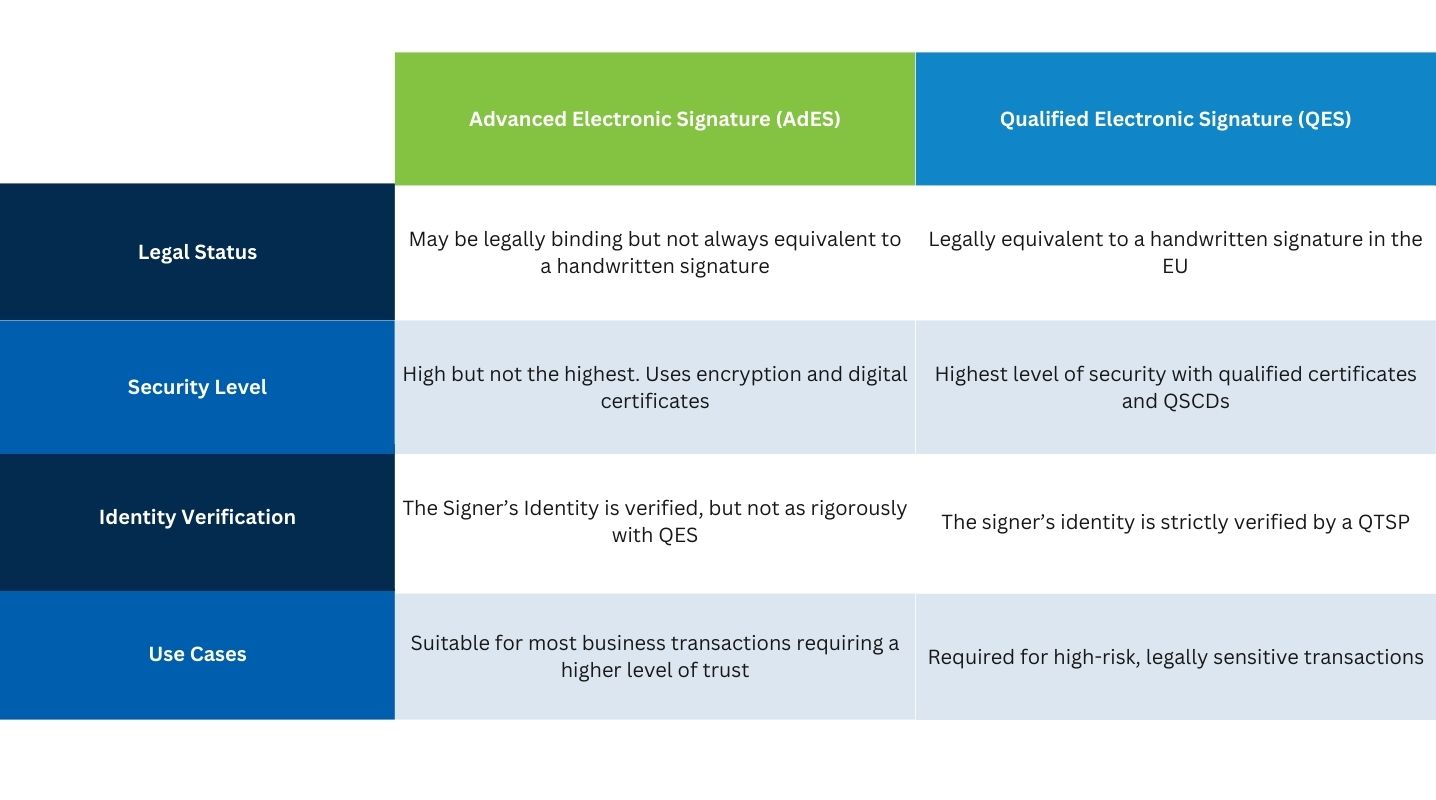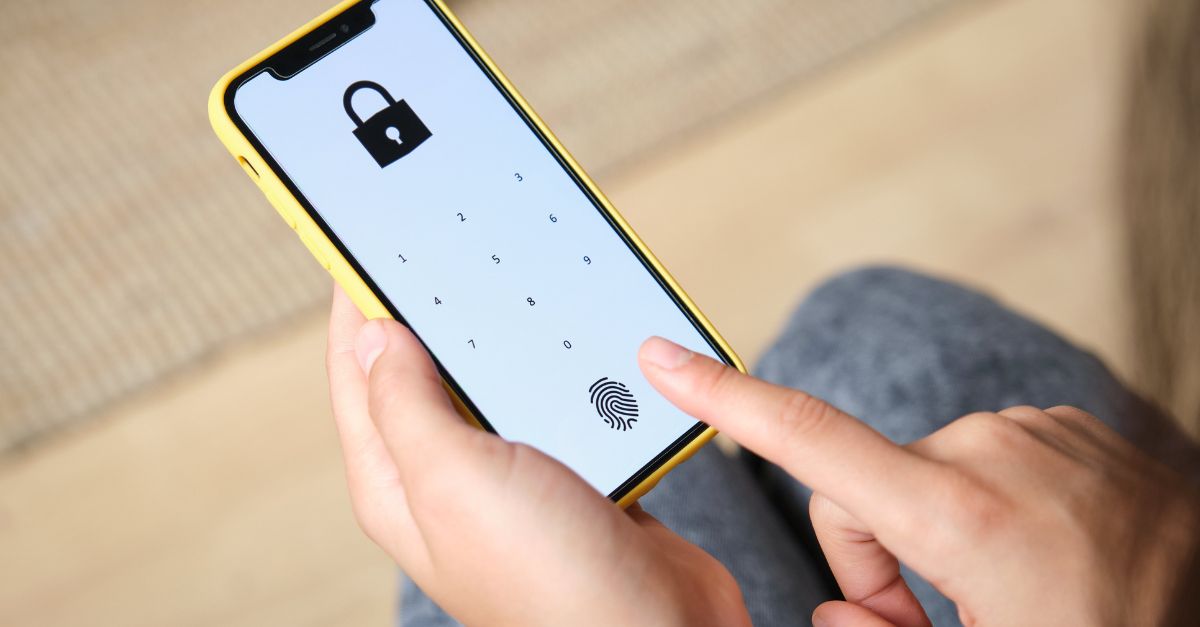Electronic signatures have become essential for businesses to streamline processes, reduce paperwork, and ensure efficient transactions. However, not all types of electronic signatures are created equally. Two of the most important types to understand are Advanced Electronic Signatures (AdES) and Qualified Electronic Signatures (QES). There are crucial questions which businesses must consider to understand the key differences between AdES and QES, as well as the potential pitfalls to avoid when selecting a vendor for qualified electronic signature solutions.
Understanding the Basics
What is an Advanced Electronic Signature (AdES)?
An Advanced Electronic Signature (AdES) offers a higher level of security than a simple electronic signature, ensuring that the identity of the signer is verified, and the integrity of the document is maintained.
Key Features of AdES:
- Signer Identification: The signature is uniquely linked to an individual signer, meaning it is possible to identify who signed the document
- Data Integrity: Any alteration to the signed document would invalidate the signature, ensuring that the document remains unchanged after signing
- Public Key Infrastructure (PKI): AdES typically relies on PKI technology, which involves encryption and digital certificates to ensure the authenticity of the signing party
AdES is widely used for many business transactions where a higher level of trust is required but doesn’t necessarily need to meet the strictest legal requirements.
What is a Qualified Electronic Signature (QES)
A Qualified Electronic Signature (QES) represents the highest level of security and trust in the realm of electronic signatures. It is fully compliant with the EU’s eIDAS regulation and holds the same legal standing as a handwritten signature.and holds the same legal standing as a handwritten signature.
Discover our eBook and shed light on eIDAS
Key Features of QES:
- Qualified Certificates: QES is created using a qualified certificate issued by a Qualified Trust Service Provider (QTSP). This certificate is a digital file that verifies the identity of the signer
- Qualified Signature Creation Device (QSCD): The signature must be generated using a QSCD, which is a secure device that ensures the integrity and authenticity of the signature
- Legal Equivalence: QES is legally recognized as equivalent to a handwritten signature across the EU, providing the highest level of assurance in legal and regulatory matters
Comparing AdES and QES: Key Differences

Choosing the Right Qualified Electronic Signature Vendor
Essential Questions to Ask (and Common Pitfalls)
When it comes to implementing a QES solution, selecting the right vendor is crucial. Here’s a comprehensive list of questions to help you to evaluate potential vendors, as well as some common pitfalls to avoid and ensure that you are receiving the right solution for your business:
1. Are They a Qualified Trust Service Provider (QTSP)?
- Why it matters: Only QTSPs can issue the qualified certificates required for QES. If the vendor is not a QTSP, you’re not getting a true QES solution
- Pitfall: Some vendors may imply they offer QES but are not officially recognized as QTSPs. Always verify their status on the EU Trusted List or equivalent regulatory body
2. Do They Provide a Qualified Signature Creation Device (QSCD)?
- Why it matters: A QES must be created using a QSCD. This ensures the highest level of security and compliance
- Pitfall: If the vendor doesn’t offer a QSCD, they are likely only offering AdES. Be cautious of vendors who downplay the need for this device
3. How is Identity Verification Handled?
- Why it matters: For a QES, identity verification must be rigorous, involving in-person checks or secure remote verification
- Pitfall: Vendors offering simple, online verification methods without proper checks are not providing QES. This will indicate an AdES-level solution disguised as QES
4. What is the Onboarding Process Like?
- Why it matters: A true QES onboarding process will include stringent identity verification steps
- Pitfall: If onboarding is too quick and doesn’t involve rigorous identity checks, you might be dealing with an AdES solution. QES onboarding usually requires more time and effort to ensure compliance
5. How Do They Ensure Data Privacy and Security?
- Why it matters: Data protection and encryption are crucial for both AdES and QES. However, QES solutions follow stricter guidelines
- Pitfall: Vendors that lack clear data encryption policies or do not mention compliance with regulations like GDPR may not be offering a genuine QES solution
6. Are They Compliant with Relevant Regulations in Your Jurisdiction?
- Why it matters: QES solutions must comply with local and international regulations
- Pitfall: Vendors that are not clear about compliance may be offering an AdES solution instead. Ensure they adhere to eIDAS or other relevant legal frameworks
7. What is Their Experience in Your Industry?
- Why it matters: A vendor experienced in your sector will better understand your needs and regulatory requirements
- Pitfall: Vendors with little to no experience in providing QES solutions in your industry may not be fully equipped to handle your requirements
8. What Are Their Pricing Models?
- Why it matters: Understanding the cost structure ensures that you know what you’re paying for
- Pitfall: Beware of vendors offering significantly lower prices, as this often indicates they are selling AdES instead of QES. A genuine QES solution tends to have a higher cost due to the rigorous compliance and security measures involved
Understanding the differences between an Advanced Electronic Signature (AdES) and a Qualified Electronic Signature (QES) is crucial for making informed decisions about electronic signature solutions. While AdES provides substantial security and trust for many business transactions, QES offers the highest assurance, legal validity, and security for critical, legally binding transactions. The same goes for Qualified Seals, your use case may require the use of seals rather than signatures.
Find out more about different types Digital Seals
By asking the right questions and being aware of the pitfalls, you can avoid investing in a solution that doesn’t meet your legal and security requirements. We encourage you to use this guide as a checklist to ensure that the electronic signature solution you choose is truly qualified and meets your organization's needs, or why not contact us as your trusted CA, to discuss your requirements.
Contact our experts to discuss which signing solution is right for your business







